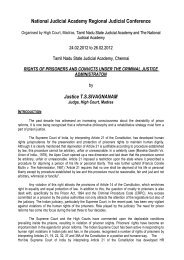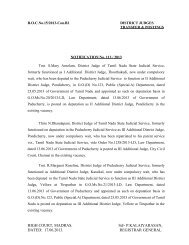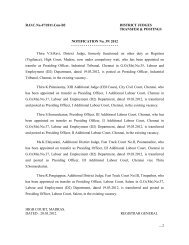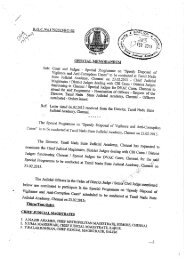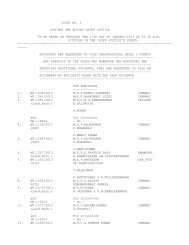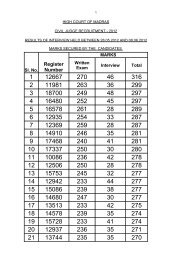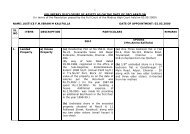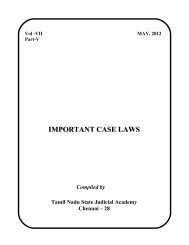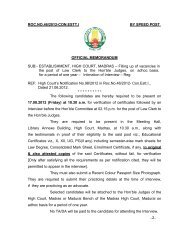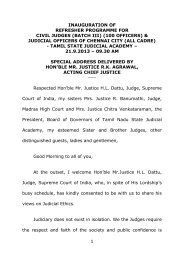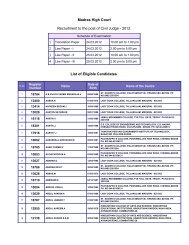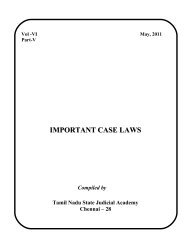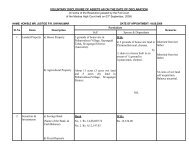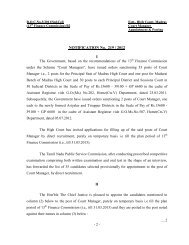Appreciation of Evidence in Sessions Cases - Justice D.Murugesan
Appreciation of Evidence in Sessions Cases - Justice D.Murugesan
Appreciation of Evidence in Sessions Cases - Justice D.Murugesan
You also want an ePaper? Increase the reach of your titles
YUMPU automatically turns print PDFs into web optimized ePapers that Google loves.
APPRECIATION OF EVIDENCE<br />
INTRODUCTION:<br />
Substantive Law def<strong>in</strong>es the rights, duties and liabilities and Adjective Law def<strong>in</strong>es the<br />
plead<strong>in</strong>g and procedure, by which the substantive law is applied <strong>in</strong> practice. Purpose <strong>of</strong> law <strong>of</strong> evidence is<br />
the establishment <strong>of</strong> facts <strong>in</strong> issue, by proper legal means, to the satisfaction <strong>of</strong> the Court and this is done<br />
by production <strong>of</strong> evidence. Accord<strong>in</strong>g to Bentham, 'evidence' is any matter <strong>of</strong> facts, the effect, tendency<br />
or design <strong>of</strong> which is to produce <strong>in</strong> the m<strong>in</strong>d, a persuasion, affirmative or dis-affirmative, <strong>of</strong> the existence<br />
<strong>of</strong> some other matter <strong>of</strong> fact. Best def<strong>in</strong>es 'evidence' as "<strong>in</strong>clud<strong>in</strong>g" all the means, exclusive <strong>of</strong> mere<br />
argument, by which any alleged matter <strong>of</strong> fact, the truth <strong>of</strong> which is submitted to <strong>in</strong>vestigation, tends to be<br />
or would be established or disproved to the satisfaction <strong>of</strong> the Court. As per the Indian <strong>Evidence</strong> Act,<br />
'evidence' means and <strong>in</strong>cludes all statements, which the Court permits or requires to be made before it by<br />
witnesses, <strong>in</strong> relation to matters <strong>of</strong> fact under enquiry and all documents <strong>in</strong>clud<strong>in</strong>g electronic records<br />
produced for the <strong>in</strong>spection <strong>of</strong> the Court. Accord<strong>in</strong>g to Stephen, the <strong>in</strong>strument by which the Court is<br />
conv<strong>in</strong>ced <strong>of</strong> a fact is evidence and it is <strong>of</strong>ten classified, as be<strong>in</strong>g either direct or circumstantial. Direct<br />
evidence is a statement <strong>of</strong> what a man has actually seen or heard. Circumstantial evidence is someth<strong>in</strong>g,<br />
from which fact <strong>in</strong> issue to be <strong>in</strong>ferred. In usage, evidence may be reduced to three heads (1) oral<br />
evidence, (2) documentary evidence and (3) material evidence. Law <strong>of</strong> evidence deals with two aspects,<br />
quid probandum, i.e., th<strong>in</strong>g to be proved and modus probandi, that is mode <strong>of</strong> prov<strong>in</strong>g. <strong>Evidence</strong> Act deals<br />
with relevancy, admissibility and pro<strong>of</strong>. The probative effects <strong>of</strong> evidence <strong>in</strong> civil and crim<strong>in</strong>al cases are<br />
not always the same and it has been laid down that a fact may be regarded as proved <strong>in</strong> a civil case,<br />
though evidence may not be considered sufficient for a conviction <strong>in</strong> a crim<strong>in</strong>al case. Civil cases may be<br />
proved by a mere preponderance <strong>of</strong> evidence, whereas <strong>in</strong> crim<strong>in</strong>al cases, the prosecution must prove the<br />
charge beyond reasonable doubt. Law relat<strong>in</strong>g to burden <strong>of</strong> pro<strong>of</strong> deals with the question, by whom and <strong>in</strong><br />
what manner, evidence must be produced and by which party, any fact is to be proved. It determ<strong>in</strong>es the<br />
right and liability to lead evidence and right <strong>of</strong> rebuttal. A fact is said to be proved, when, after<br />
consider<strong>in</strong>g the matter, the Court either believes it to exist, or considers its existence so probable that a<br />
prudent man, ought to act, upon the supposition that it exists. A fact is said to be disproved, when after<br />
consider<strong>in</strong>g the matter before it, the Court either believes that it does not exist or considers its nonexistence<br />
so probable that a prudent man, ought to act, upon the supposition that it does not exist. A fact<br />
is said to be 'not proved' when it is neither proved nor disproved. Test <strong>of</strong> pro<strong>of</strong> is the test <strong>of</strong> probabilities<br />
upon which a prudent man may base his op<strong>in</strong>ion. In a crim<strong>in</strong>al case, pro<strong>of</strong> does not rest on mere<br />
preponderance <strong>of</strong> probability and the prosecution has to discharge the burden to a greater degree <strong>in</strong> pro<strong>of</strong>,<br />
beyond reasonable doubt. The presumption is that the accused is <strong>in</strong>nocent till the contrary is clearly<br />
established. The burden <strong>of</strong> pro<strong>of</strong> that the accused is guilty is always on the prosecution and if there is<br />
reasonable doubt about the guilt <strong>of</strong> the accused, benefit <strong>of</strong> doubt must go to him. Cockburn, C.J.<br />
said, "the doubt, the benefit <strong>of</strong> which the accused is entitled, must be such as, rational th<strong>in</strong>k<strong>in</strong>g, sensible<br />
man may fairly and reasonably enterta<strong>in</strong>, not the doubts <strong>of</strong> a vacillat<strong>in</strong>g m<strong>in</strong>d that has not the moral<br />
courage to decide but shelters itself, <strong>in</strong> a va<strong>in</strong> and idle skepticism. There must be doubt which a man may<br />
honestly and conscientiously enterta<strong>in</strong>."<br />
Pro<strong>of</strong> is to be attempted by produc<strong>in</strong>g oral and documentary evidence, material objects,<br />
marshall<strong>in</strong>g probabilities, highlight<strong>in</strong>g surround<strong>in</strong>g circumstances and rely<strong>in</strong>g on admissions and<br />
1



